Duch Denies Targeting of Cham and Forced Marriages During Regime
Former Chairman of S-21 Kaing Guek Eav, alias Duch, was scrutinized today both by Co-Counsel for the Defense of Khieu Samphan Anta Guissé and Co-Counsel for the Defense of Nuon Chea Victor Koppe. Exchanges between the witness and the counsels were comprehensive, thorough, and at times, confrontational. Mr. Victor Koppe accused the Chamber of interfering with his questioning. Both Defense Co-Counsels covered a broad array of subjects deriving from the extent of Duch’s knowledge beyond S-21, the hierarchical structure of the Communist Party of Kampuchea (CPK), Duch’s relationship with higher ranked officials, rebellion plans to overthrow Pol Pot and nation-wide policies of targeted killings.
The fall of the Khmer Rouge, January 1979
Before Co-Counsel Lawyer Anta Guissé could utter a word, Senior Assistant Prosecutor Dale Lysak went back on the military court interview the witness was confronted with yesterday. Mr. Lysak rectified the date of the interview from 1999 to 2002, and that it bore a noticeable difference compared to his other statements in front of that court: in all the other interviews, his name is handwritten underneath the thumb print, but this one only bore his thumb print[1]. Responding to the Prosecution, Ms. Guissé objected to the manner: “my colleague is trying to give the witness an exit door”. Right behind her sat the accused Khieu Samphan, who shook his head, half-smiling.
The Defense Lawyer then picked up where she left off yesterday and asked the witness to clarify a statement he had made to the Co-Investigating Judges in 2007, about the January 6 meeting chaired by Khieu Samphan that he attended the day before the Vietnamese troops entered Phnom Penh[2]. Duch described that he told Hor about the instructions, which were to remain calm and to keep working. The practice was that when he gave an order to Hor, his second-in-command at S-21, he would then disseminate it to the rest of the staff. “At S-21, the instructions from the Party was always trusted”, he said. Duch did not give a straight-forward answer to Ms. Guissé as to whether he had gotten confirmation from Hor, but she nonetheless insisted on the dissemination of instructions that particular day. The witness snapped:
“It is clear enough for someone who has a brain to think.”
Ms. Guissé decided to go forward and had the witness confirm a 2009 statement by Suos Thy, former S-21 list-keeper: “before the arrival of the Vietnam troops in 1979, we weren’t informed of anything: we were in the dark, in ignorance, that was the situation” [3].
Contradicting statements: final attempt at clarification
Defense Counsel then once again showed the 2002 statement of the witness in front of the military court (mentioned yesterday as the 1999 statement) [4]. She inquired about the contradiction between this statement and yesterday’s testimony: did he, in fact, ever meet Khieu Samphan and Ieng Sary? Though the witness requested the whole interview instead of an excerpt and President of the Chamber Nil Nonn pointed out that the Counsel had spent a fair amount of time on the document, Ms. Guissé pushed the witness to answer her question, in vain.
Trying a different angle, Ms. Guissé asked about the time Pang, Duch’s immediate superior, was detained at S-21. She inquired about his interrogation by Pon, and Duch said he did not know which methods were used on him. In the audio transcript of interviews conducted in May in July 1999 by OHCHR Representative Christophe Peschoux, the witness stated that “Khieu Samphan was a full member of the CPK in charge of administrative work; he was the State President. Based on the confessions of Pang, I had a chitchat with him. In some necessary cases, Khieu Samphan was invited to these meetings as well”[5]. This statement was in contradiction with what the witness said yesterday:
“Mr. Witness, why did you say you had not spoken to Pang when he was at S-21?”
Duch remembered that François Roux, his lawyer at the time of his trail, challenged this information since there seemed to be a confusion as to who he had talked to. Ms. Guissé was struggling to keep Duch on track and both Mr. Lysak and Judge Nil Nonn said the witness had told her everything he knew on the subject. However, Duch rarely gave direct answers. Before the President adjourned the hearing for a break, he had the witness confirm that he indeed challenged the 1999 excerpt.
In another part of a 1999 interview, Duch described:
“Sometimes, I went to converse with prisoners who had already been interrogated, [including Chu Chet and Vorn Vet]. I wanted to know about the lives of Pol Pot, Ieng Sary, Khieu Samphan when they were in France; Vorn Vet and Chu Chet could tell me about the internal structure and history of the CPK. […] Per say, I was only involved in the interrogation of Koy Thuon and Thoy Puhn.”[6]
Cutting him off before he went into one of his customarily long explanations, Ms. Guissé asked the witness if this 2002 statement was distorted in any way. Duch denied it was, and after Mr. Lysak and Judge Nil Nonn interjected once again, it was clarified that it was rather a mistake in the transcript.
Ms. Guissé was briskly sifting through the documents of her binder, visibly irritated that she did not obtain clear answers from witness Duch.
“I have the impression that when I tackle some topics, I get interrupted.”
The principle of secrecy
Ms. Guissé was aware that she did not have much time left to ask the witness some more questions, so she switched to a more rapid pace. She asked the witness how it was possible that Ponh, interrogator at S-21, could speak freely of his work to him even though this principle of secrecy was strictly applied under the regime. Duch admitted he would not be aware of all the details.
Defense Lawyer Anta Guissé then highlighted several other discrepancies in some of Duch’s statements[7].
“Mr. Witness, the reality is that you were far from the Center and did not know how it functioned, and you did not know how the CPK functioned.”
Duch confirmed he was not part of the upper echelon of the Communist Party of Kampuchea (CPK), but that his knowledge was obtained during the regime and came from the mentions Son Sen, Minister of National Defense under the Khmer Rouge, made of the Permanent Committee, notably on a document dating from March, 1976. Concluding her interrogation on the same note she started it on, Ms. Guissé pointed out one more incoherence: in the case of this 1976 document like for others, Duch had said he only accessed them later, during his trial.
Failed coup d’état against Pol Pot?
Co-Counsel for the Defense of Nuon Chea Victor Koppe was granted the floor and resumed his interrogation. Last Tuesday, Mr. Koppe shed light on additional elements relating to revolutionary plans to overthrow the Khmer Rouge regime.
Duch seemed to have limited knowledge about such plans which involved, Mr. Koppe asserted, Sao Phim, Ruos Nhim, Koy Thuon as well as Chan Chakrei, and 310 Division Commander Oun[8].
Mr. Koppe relied on several documents in order to ask Duch if Son Sen had talked with him about his military tactics on any occasion. First, he mentioned the minutes of a plenum meeting of the Central Committee of the Vietnamese Communist Party according to which decision was made to start an internal uprising in the Democratic Kampuchea and that if it did not work, they would invade the country[9]. Mr. Koppe then referred back to a meeting with Secretary and Deputy Secretaries of the CPK in which Son Sen mentioned a “Czechoslovakia style”[10] invasion by the Vietnamese. [11] However, the witness was not able to provide any additional information about the subject.
The Co-Defense Counsel mentioned an article by Nayan Chanda in the Far Economic Eastern Review not yet on the case file[12], and further quoted Chanda’s book Brother Enemy: The War After the War [13]:
“In late January 1978, General Grigorevich Pavlovski, Commander in Chief of the Soviet Ground Forces, arrived in neighboring Laos […] for a friendly visit. Vietnamese Minister of Defense, General Vun Ye Yap flew to [Laos] for an unpublicized meeting with the Soviet General to review the Cambodian situation. Pavlovski’s advice […] was: “Do a Czechoslovakia”. […] The Vietnamese should remove Pol Pot from power, the way the Soviet Union removed Alexander Dubček in Prague in 1968. […] The Vietnamese would solve the problem “in their own appropriate way”.”[14]
Mr. Koppe mentioned an additional document[15], but Duch stated that he never received information about such an invasion plan – he was not well aware of the international situation at the time.
Contemplated coup d’états in 1977
The cross-examination of Duch resumed after the break. Mr. Koppe made reference to a document redacted by Duch in which he spoke about the involvement of Brother Oeun and Comrade Vun from Division 310: “this problem has been fixed, we deleted and re-typed the information”.[16] Duch did not recall the document, the date of Oeun’s arrest (18/02/1977 according to Counsel) or who implicated him, only saying he knew that Oeun was under surveillance for “quite some time”.
For his next questions, Counsel Koppe carefully listed the documents that were not allowed to be used in Court, including confessions, notably Koy Thuon’s confession, Pon’s notebook from S-21, and notes from a meeting during which Son Sen and Oun, Ministry of Commerce at the time, were present. However, Mr. Koppe asked the witness if he knew any details about plans for a coup d’état, to stage a rebellion which would have originated from Koy Thuon, Division Commander of 310 Oeun, Chan Chakrei, Hun Sen, the current Prime Minister, and others, possibly involving military attacks on Pochentong airport and Radio Phnom Penh. Duch firmly said he had only heard the name Hun Sen after the fall of the Khmer Rouge, in 1979 – moreover, he had no knowledge of any rebellion plan.
The Defense stood on strong ground when tackling the subject of coups d’état: there was a number of sources to assert each point Mr. Koppe was trying to make while interrogating the witness. For this next segment, testimonies of around ten combatants from Division 310 were mentioned, and all these combatants spoke of a plan to stage a coup d’état in early 1977, which was then compromised.[17]
“One day, I was called into a meeting at Wat Phnom, where Ta Yem, the Battalion Chairman, made an announcement to combatants of Battalions 306 regarding plans to carry out a coup. He said that at 3 am, we would open fire and attack and take the Radio Station near Wat Phnom in order to make an announcement. That night, suddenly, Ta Oeun, Ta Si Nuon, […] along with Oun who was in the Ministry of Commerce at the time [and other Battalion Chairmen] were called by the upper echelon for a meeting and then disappeared. […] Approx. 300 combatants had attended a meeting at 4 pm where Ta Yem made an announcement and after that, the weapons were readied.”[18]
Several more testimonies were listed by Defense Lawyer Koppe[19], but Duch did not have any knowledge about such events and said he did not believe they were true.
“It doesn’t seem like a workable plan at all. […] The plan was surreal.”
Listing all the documents took some time, and even though Duch did not have much information about the subject, he still elaborated on separate topics, leading Senior Assistant Prosecutor Dale Lysak and Judge Claudia Fenz to interject and ask the Defense Counsel to refrain from asking the witness to speculate if he did not know the answer to his questions. Mr. Koppe protested and argued that the “peculiar” witness was not providing him with evidence. In a tense atmosphere, the President called for a break.
Heated exchange between the Chamber and Co-Defense Counsel Mr. Victor Koppe
Victor Koppe: “Mr. Witness, let’s see if you can sabotage this one as well. […]”
Dale Lysak: “I object to this continual commentary and attacking the witness. […]”
Victor Koppe: “I withdraw.”
Judge Nil Nonn: “[…] Please behave in the courtroom.”
Victor Koppe “Sabotaging with your assistance, if I might add.”
Judge Claudia Fenz: “Just stop it, it doesn’t get any better.”
Victor Koppe: “No. No, I won’t stop it. It’s a travesty here. It’s incredible.”
Mr. Koppe stifled a chuckle and moved on to his interrogation.
Plans to overthrow Pol Pot in the Northwest zone
An extract from Tet Sambath’s book was presented to the witness, and the testimony from a former Khmer Rouge cadre made mention of a “very big” plan to topple the Khmer Rouge regime, led by the Northwest and East Zones.[20] Another document made mention of preparations for a major incursion by Vietnam in 1977, with the inside help from Sao Phim, Hem, Hun Sen, Samrin and eight others who had left for Vietnam before and were now returning.[21] Like before, Duch did not recall any details related to this. He was listening carefully to Mr. Koppe, turned so that he could face him and look at him with what seemed to be great curiosity.
Lastly and in vain, Mr. Koppe referred to an interview Heng Samrin, Khmer Rouge commander and instigator of a contemplated coup, gave about 1976-1977:
“We had a struggle, but a secret one. But at that time, it was tight and cramped. There was no opportunity to rise up and struggle. Even Ta Phim [Sao Phim] had to struggle.”[22]
Confronted with quotes about the CPK being divided into different factions, the witness was unable to give a substantial answer[23]. Mr. Koppe asked the witness: “why is it that you don’t know anything about this?” but Mr. Lysak objected, accusing the Co-Defense Counsel of attacking the credibility of the witness.
Mr. Koppe then read excerpts from Duch’s own testimony. The first one, about how “Son Sen had adopted the same attitude as Koy Thuon with the Vietnamese delegation”, helped the witness to remember that Koy Thuon was very close to the Vietnamese delegation.[24]
The next excerpt mentioned that there was not a clearly established policy to arrest Vietnamese nationals, which Duch confirmed[25]. He also stated that there was no policy to exterminate Cham people. If a Cham committed a mistake, he or she would be arrested.[26] The same statement was made by him regarding former Lon Nol soldiers: “In S-21, there was no single general of Lon Nol, not a single minister of Lon Nol, not a single singer of Lon Nol, not a single royal member of Lon Nol.”[27]
Duch testified he had never seen any document from the party describing a countrywide policy related to forced marriages.[28] It was of course surprising to hear these statements, but Mr. Koppe’s questions were precisely crafted to reflect the idea that the witness was unaware of a nationwide policy of targeting specific groups.
“So Mr. Witness, to summarize: you are unaware of a policy to target Vietnamese citizens, you are unaware of a policy to target Lon Nol soldiers, you are unaware of a policy to target or exterminate Cham, you are unaware of a policy in relation to forced marriage. Correct?”
Secrecy and S-21
Co-Counsel for the Defense of Nuon Chea Victor Koppe asked Duch his opinion regarding the influence of the 1965 Indonesian coup d’état on the CPK, which he said, quoting Ben Kiernan, “had killed an estimated 500,000 people” in less than a year.[29] More specifically, Mr. Koppe asked the witness if the principle of secrecy he applied at S-21 was similar to the one under the Indonesian regime. Duch denied it was, but remembered that the party lines of the CPK were as such: “If the information leaked, we would die. […] So there were four principles in relation to secrecy: do not know, do not say, do not hear and do not see.”
Mr. Koppe asked the witness if he knew how prisoners were taken to Choeung Ek, which he did not. Him Huy would have had this information.[30] He also didn’t know if prisoners were taken from Prey Sar to Choeung Ek directly[31].
This hearing marked the end of a long week for Kaing Guek Eav, alias Duch. He was questioned by the Defense all four days in an occasionally heated atmosphere. Both Ms. Anta Guissé and Mr. Victor Koppe looked at disparities between statements by the witness, the limitations of his knowledge outside of S-21 as well as the international and contextual influences before and during the Khmer Rouge period. The Defense will conclude its cross-examination of the witness on Monday morning, at 9am.
Featured image: Kaing Guek Eav, alias Duch. (ECCC: Flickr)
[1] E3/530.
[2] E3/452, at 00146558 (KH), 00147933 (FR), 00147571 (EN).
[3] E3/7466. 28/07/2009.
[4] E3/530, at 00095691 (KH).
[5] E3/347, at 00002494 (KH) and 00002496 (KH), 00002506 (EN) and 00002507 (EN). Re-transcription by Stephen Heder.
[6] E3/1560, at 003230787 (KH), 00327329 (FR), 00327326 (EN).
[7] E3/93.2.
E3/1625, at 000111292 (KH), 00759709 (EN), 00761023 (FR).
In June 2016, Duch referred for the first time to a Committee called “Kru Chak Euk” or permanent committee. Today, he repeated the composition of the permanent committee (also called 870 committee).
[8] E3/834, at 00184498 (EN), 00077476 (KH). 18/06/1978
E3/7327, at 00015679 (EN), 001113795 (KH).
[9] William J. Duiker: “China and Vietnam, the Roots of Conflict”. Plenum February 1978 meeting and Nayan Chanda for the Far Economic Review, E3/2376, at 00192419 (EN), 00191572 (KH), 00237095 (FR).
[10] In 1978, Czechoslovakia was invaded by the Soviet Union.
[11] E3/13, at 00052406 (KH), 00334976 (FR).
[12] E3/2376, at 00192419 (EN), 00191572 (KH), 00237095 (FR). On the shared drive as S00014053 (article from December 15, 1978), S00014450 (article from February 23, 1979) and S00011805 (August 11, 1978).
[13] E3/2376, at 00192401 (EN), 00237080 (FR), 00191551 (KH). Footnote 49 in Nayan Chanda’s book, at 00192622.
[14] E3/2376, at 00192622 (EN).
[15] E3/540, at 01246939 (EN). January 20, 1978 report from the East German Minister of Foreign Affairs: “confidential reports state that the Socialist Republic of Vietnam is striving for a solution of the kind that would enable the remaining patriotic forces of Kampuchea to seize the initiative and rest power from Pol Pot and his followers. Of the current group of five in Phnom Penh, political bureau member Nuon Chea alone has yet to compromise himself vis-à-vis the socialist republic of Vietnam”.
[16] E3/1197, at 00002267 (KH), 00506641 (EN), 00498636 (FR).
[17] E3/7535, at 00324168-71, 00087817-22 (KH), 00324206-210 (FR). TCW-1029 “Oun was linked to the Yun who wanted to uprise in PP.” “first secret meeting and instructed us that he will attempt a coup.” If we could not defeat Pol Pot, we would appeal to Vietnam and call Chakrey.”
E3/7540 (TCW-1030).
[18] E3/509, at 00282217 (EN), 00270159 (KH), 0028559798 (FR).
[19] E3/7583, at 00876559 (EN), 00404996 (FR).
E3/7156, at 00876495 (EN), 00020576 (KH), 00892645 (FR). Sem Hun, who appeared in Court on 22/06/2015.
E3/7540, at 00055077 (KH), 00337712 (EN), 00364274 (FR).
[20] E3/4202, at 00757531-2 (EN), 00858339-42 (KH), 00849435-7 (FR).
[21] E3/1593, at 001150194 (EN), 00637921 (KH), 0639154-55 (FR).
[22] E3/1568, at 00651889 (EN), 00713962 (KH), 00743361 (FR).
[23] E3/9579, at 01063797 (KH) and E3/7325, at 01010622 (EN), 01063797 (KH).
[24] E3/359, at 00434345 (EN), 004008232 (KH), 00408247 (FR).
[25] E3/429, at 00403926 (EN), 00403912 (KH), 00403938 (FR).
[26] E3/429, at 00403925 (EN), 00403913 (KH), 00403937 (FR).
[27] E3/429, at 00403920 (EN), 00403909 (KH), 00403932 (FR).
E3/10586, at 00326765 (EN), 00320751-52 (KH), 00326770 (FR).
[28] E3/5789, at 00414333 (EN), 00410171-72 (KH), (FR).
[29] E3/9362, at 00791990 (EN), 00787946 (KH), 00792707 (FR).
[30] E3/748, at 00153568 (EN), 00153460 (KH), 00153446 (FR).
[31] E3/1578, at 00194549 (EN), 00178024 (KH), 00178036 (FR).
E3/1578, at 00194552 (EN), 00178027 (KH), 00178040 (FR).

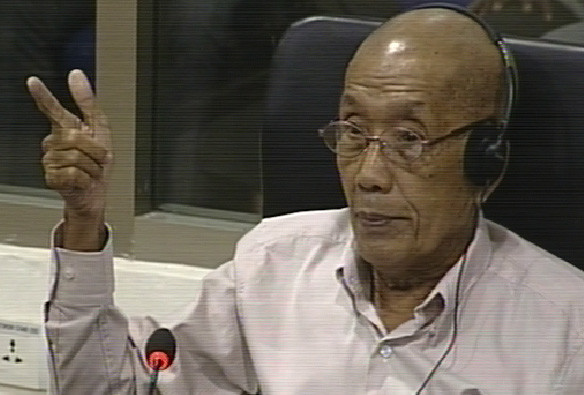
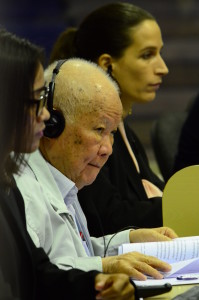
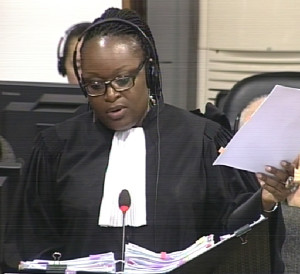
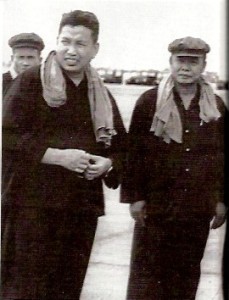
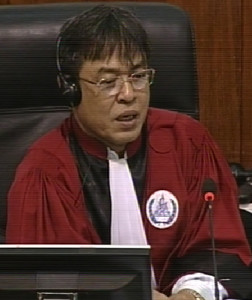
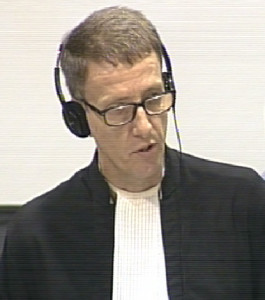
[…] See Duch Denies Targeting of Cham and Forced Marriages During Regime, The Cambodia Tribunal Monitor, June 23, […]